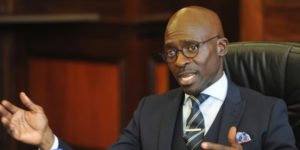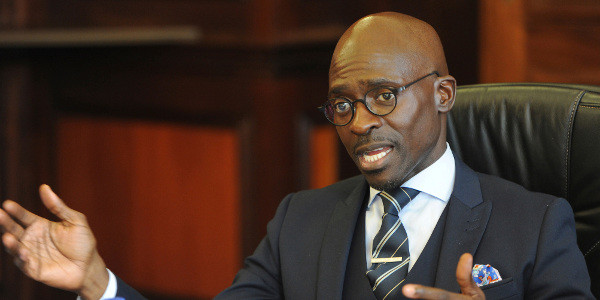With a timeline.
13/07/2017 15:21 SAST | Updated 5 minutes ago
Ferial Haffajee Editor-at-large, HuffPost South Africa

Malusi Gigaba.
ANALYSIS
I don’t mean to be the Winter Grinch, but Finance Minister Malusi Gigaba’s Inclusive Growth Action Plan is an elegant sounding bag of hot air with a new name.
The minister has attempted to give his economic growth plan a sense of urgency by attaching urgent timelines and responsibilities to it.
But if you dig into the plan, there is little in it to stimulate an economy on life support and an unemployment rate of 43 percent — a number which takes into account people who have grown tired of looking for work.
In a modus operandi popular with our government when it is under pressure, Gigaba’s plan is knotted in bureaucratic steps aimed at making politicians feel they are doing something, when in fact it amounts to very little. Examples of this abound in the minister’s document, including a financial sector summit (a talk shop) and the development of at least eight frameworks (guiding documents).
The leaked Gupta emails have revealed the extent of the crisis of corruption ripping at the heart of South Africa’s economy. Eskom, Transnet, Denel, Prasa and SAA are all in financial crisis and contributed to South Africa sitting on the cusp of a triple junk rating. It is doubtful Gigaba’s medicine will heal them. Eskom, for example, is alleged to have illegally paid almost a quarter of a billion rands to the Gupta-linked management consultancy Trillian. In addition, there are four different investigations into the mismanagement of Eskom currently ongoing.
Gigaba’s plan is knotted in bureaucratic steps that can make politicians feel they are doing something.
In the teeth of this malfeasance, Gigaba has given his political support to Eskom by allowing it to seek tariff increases that overshoot inflation by multiples. This will impact consumers and worsen the economy rather than improve it.
Read: One Thing’s For Sure About Gigaba’s Growth Plan… We Will Pay More For Electricity
With Public Enterprises minister Lynne Brown, Gigaba will establish six frameworks to improve the governance of publicly owned companies. But is this enough? These companies need excising and clearing out to ensure that they are returned to financial health, but it felt like the Cabinet has stepped back from a full fix.
For 23 years, government has promised greater private sector participation (a euphemism for privatisation) and private sector expertise in the running of state-owned enterprises. But it has always stepped back from executing on this.
Gigaba does so again. He promises that by the end of July, he will draw up, with other departments, a private sector participation framework.
The pledges the minister makes on including the private sector are a noodle soup of acronyms and jargon. Take this line: “Include PSP projects in Shareholder Compacts and Corporate Plan for subsequent implantation.” It means very little at all, but on a first hearing you may think it’s very important.
While the controversial mining charter of Mineral Resources Minister Mosebenzi Zwane is being interdicted in court by the industry, which took a R51-billion klap, Gigaba’s treatment thereof is mundane.
On the charter, he says government will, “conduct further engagements with civil society, labour and industry”. The mining sector is becoming less important to the South African economy but it remains a significant employer, and unions are worried that the charter’s implementation may mean more job losses.
The pledges the minister makes on including the private sector are a noodle soup of acronyms and jargon.
Many key sections of Gigaba’s economic stimulus plans rely on the actions of very weak ministers. Gigaba’s first pledge is to conclude a “sustainable” public sector wage settlement. This depends on the negotiating nous of Public Service and Administration minister Faith Muthambi. She does not have a fine track record after a sorry stint as communications minister and the jury is out on her ability to manage the toughest wage negotiation in the country. South Africa employs 1.3-million civil servants.
Government has again promised to free up broadband by setting tight deadlines for the Minister of Telecommunications and Postal Services, Siyabonga Cwele, but his spectrum auction plans may also face industry legal action.
Many key sections of Gigaba’s economic stimulus plans rely on the actions of very weak ministers.
Much of what Gigaba has promised is out of his hands and an audit of successive government growth stimulus plans will show it has a poor record of meeting deadlines. South Africa has, for example, missed the deadline for digital migration several times.
Three immediate steps government has promised include asking the Competition Commission to investigate data prices and to install a permanent CEO at SAA in July. In addition, it wants the Post Bank licensed by December.
The jury is out on whether Gigaba’s first big growth plan successfully makes the cut between steps to grow the economy and the need to fund the many expensive subsidies contained within its three pages.
The proof of the pudding will come in October, when the young minister delivers his first medium term budget policy statement — a document of intent. Gigaba said the country should see sparks of growth by then. The pudding can’t flop and neither can Gigaba.
http://www.huffingtonpost.co.za/2017/07/13/ferial-haffajee-malusi-gigabas-plan-is-just-an-elegant-soundin_a_23027954/?utm_hp_ref=za-homepage

